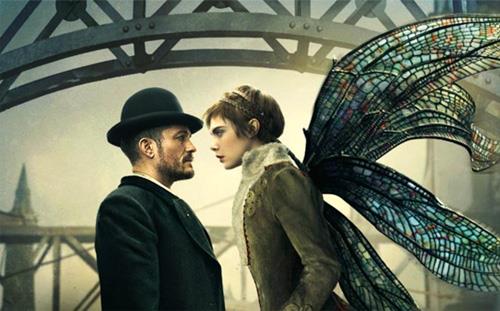
Carnival Row finally debuts on Amazon Prime Friday, almost five years after it was announced, and the creators clearly spent much of that time figuring out how to turn a Victorian fantasy tale into an epic.
Carnival Row succeeds in that quest, sort of, although sometimes when it goes for complex, it ends up with confusing.
The Victorian era’s seductively claustrophobic ambiance has made it fertile turf for both real-life and fantasy dramas, from Ripper Street to Penny Dreadful. Something about those ladies’ bustles and the men’s bowler hats, perhaps.
Carnival Row uses Victorian trappings to spin an otherworldly tale, a la Game of Thrones, blending fantasy kingdoms and supernatural beings in ways that – surprise, surprise – mirror with eerie precision the way we real-life humans often behave.
The broad setup of Carnival Row, summarized on-screen at the beginning of the first episode, tells us that once upon a time there were beings called The Fae who lived in peace and harmony in their own kingdom.
The Fae looked mostly like humans, except that some of them had insect-like wings and could fly. Like, you know, faeries, thus the name.
The kingdom of The Fae had great riches, which was both the good and the bad news. Good because it enabled the Fae to live their peaceful and happy lives. Bad because once other kingdoms got wind of it, they decided they’d like to get some of those riches for themselves.
Thus did kingdoms called The Pact and The Burgue wage war for many years over the kingdom of The Fae. Then, seven years before our story begins, The Burgue pulled out and left The Pact to take over.
The Pact are not benign masters. They enslave or kill The Fae, who are largely defenseless. So The Fae have been emigrating en masse to The Burgue, whose people at first welcomed them and then gradually began feeling ambivalent.
The Fae are taking good Burgue jobs, you know, that kind of thing. So even though The Fae are industrious, accommodating, and live in the worst part of The Burgue, Carnival Row, they are more and more resented as burdensome interlopers.
Against this backdrop, we have Rycroft Philostrate (Orlando Bloom, top), an upstanding Burgue policeman who finds himself investigating a series of seemingly random murders that are ratcheting up the tension between the angry element of the Burgue population and the increasingly nervous Fae refugees.
Even though finding the perp here would seem to be good for everyone, Philo meets considerable resistance to his investigation. By the end of the first episode, we get a strong clue as to why. Hint: Think supernatural in the dark and evil sense.
Complicating Philo’s life further is a visitor from his past: Vignette Stomemoss (Cara Delavingne, top), a Fae who after seven years in the resistance has made her way to the Burgue.
The two have a complicated and intense history, which after an awkward reunion picks up again. Vignette is hardly the gentle faerie of Fae legacy, though, and her view of the world isn’t softened by the fact that to live in the Burgue she must accept being an indentured servant to the rich, oblivious and obnoxious Imogen Sturnrose (Tamzin Merchant) and her equally awful brother Ezra (Andrew Gower).
That is to say, Carnival Row packs personal drama, socio-political metaphor, and really creepy supernatural stuff in its quasi-make-believe world.
The creators shy away from none of this. It’s an ambitious production.
In fact, at times it may get too ambitious, creating so many sub-dramas and subplots that the greater arc gets a little blurred.
When a show goes through years of development, it’s generally because there are different visions of exactly where it should go. While Amazon is sufficiently confident that it has already renewed Carnival Row for a second season, viewers may need a bit of time to fully sort out the first one.